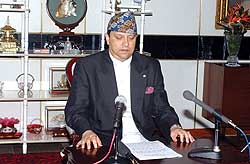 The past year had given King Gyanendra a chance to make a mark in history-a chance that is rarely available for the royals in countries with constitutional monarchies. Whether the takeover of the executive power by the king in October 2002 was constitutional or not will remain a debatable issue for years to come. However, given the state of the state, which was at the brink of collapse at that time, the intervention by the king who commanded absolute loyalty of the security agencies and a majority of public was probably a politically correct step.
The past year had given King Gyanendra a chance to make a mark in history-a chance that is rarely available for the royals in countries with constitutional monarchies. Whether the takeover of the executive power by the king in October 2002 was constitutional or not will remain a debatable issue for years to come. However, given the state of the state, which was at the brink of collapse at that time, the intervention by the king who commanded absolute loyalty of the security agencies and a majority of public was probably a politically correct step. Hence, there was a virtual silence at the king's move. He had the support and authority to turn things around for the better, but sadly misused both, opting for blame-game instead of the statesmanship that the times and his stature demanded. His actions did not turn out to be a momentary deviation as many had initially expected. This has resulted in a sharp erosion of his legitimacy in the past year, paradoxically making him the first Nepali monarch to directly contribute to the rise of republicanism in Nepal. If Nepal indeed turns into a republic, history will not hold the Nepali people responsible.
As he faces increasing criticism from major political parties, civil society and the Maoists, he has chosen to seek solace in the support of those in the far right of the political spectrum, who hold a striking similarity with the myopia of the far left. Both believe that winning the hearts and minds of the relatively uncritical mass in far-flung areas is more crucial to consolidate power and authority than trying to convince the small but critical mass, mainly concentrated in Kathmandu valley. However, history is witness to the fact that unless the support of that critical mass is won, one will have difficulty in bringing about sustainable political change in Nepal, a fact also acknowledged by the Maoists.
It was that very mass that played a pivotal role in promoting democratic values prior to 1990 and since then has been important in sustaining those values despite the continuing battering on them from not only the far left and the far right but also those in the centre who have discredited those values for personal gain. Hence, it is natural that those in the opposite extremes find it more comfortable to deal with the less critical mass, which can be relatively easily swayed. It's no surprise that the palace is planning more civic receptions for the king in outlying regions.
However, the new year has brought signs of a possible thaw. The king gave an audience to the UML's Madhab Kumar Nepal late last week, breaking a long stalemate. That is an encouraging start and needs to be followed up. There are important lessons from Thailand, where the monarch has intervened in times of crisis but withdrawn to a passive constitutional role afterwards and gained immense respect (see 'The Thai Model', #166).
The contribution of monarchy in Thailand "has been inestimable on two planes: as the primary focus of national cohesion during the long transition, and as a beacon of commitment to lawful process and hope for its realisation," writes Roger Kershaw in his book, Monarchy in South-East Asia. He goes on to say that "this twin contribution forms the kernel of a new charisma of monarchy for the modern age, less magical but no less pregnant with Dharma than in ages past. Even in life, the King has come to be revered as-or at least 'as if'-a Living Buddha".
Perhaps Nepal is waiting for exactly such a monarch. May the Living Bishnu share knowledge and wisdom with a Living Buddha, and, may the unroyal politics of the past year transform into a royal politics in the year ahead. Amen!
Rabindra Mishra is a journalist with the BBC World Service in London.



